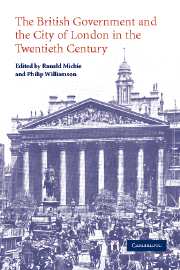Book contents
- Frontmatter
- Contents
- Notes on contributors
- Acknowledgements
- Conventions and abbreviations
- Introduction
- Part I The long perspective
- Part II Markets and society
- Part III Government and political parties
- Part IV The interwar period
- 10 Moral suasion, empire borrowers and the new issue market during the 1920s
- 11 Government–City of London relations under the gold standard 1925–1931
- 12 The City, British policy and the rise of the Third Reich 1931–1937
- Part V 1945–2000
- Select bibliography
- Index
10 - Moral suasion, empire borrowers and the new issue market during the 1920s
Published online by Cambridge University Press: 04 July 2009
- Frontmatter
- Contents
- Notes on contributors
- Acknowledgements
- Conventions and abbreviations
- Introduction
- Part I The long perspective
- Part II Markets and society
- Part III Government and political parties
- Part IV The interwar period
- 10 Moral suasion, empire borrowers and the new issue market during the 1920s
- 11 Government–City of London relations under the gold standard 1925–1931
- 12 The City, British policy and the rise of the Third Reich 1931–1937
- Part V 1945–2000
- Select bibliography
- Index
Summary
The problems of British monetary policy during the 1920s are well known. The effort to restore gold parity at $4.86, and subsequent weakness of sterling under the gold-exchange standard, preoccupied the monetary authorities and compelled the Bank of England to intervene in markets in ways that had only been faintly anticipated before 1914. In the capital market, the Bank curtailed the activities of overseas borrowers. Yet, apart from a brief period during 1925, empire governments appeared largely to escape restriction, even though their loans interfered most directly with domestic funding operations, drained what appeared to be a diminishing pool of savings, and potentially threatened both sterling and gold reserves.
This appearance, however, is partly misleading. The Empire's inclusion in the 1925 embargo on overseas loans has already been noted. But well before then its issues were incorporated in the marketing arrangements for all trustee securities introduced in 1920, and afterwards subject to the Bank's increasingly determined efforts to control the terms of all large new public offers. These measures, and their limited success, are examined here as a case study of government–City relations with respect to the Empire. While illustrating the Bank's efforts to regulate the capital market independently of official controls, they also show the extent to which it was subject to political constraints, particularly in dealing with dominion governments which enjoyed the status of domestic borrowers and whose relations with the British government were increasingly characterised by partnership rather than subordination.
- Type
- Chapter
- Information
- Publisher: Cambridge University PressPrint publication year: 2004
- 5
- Cited by



